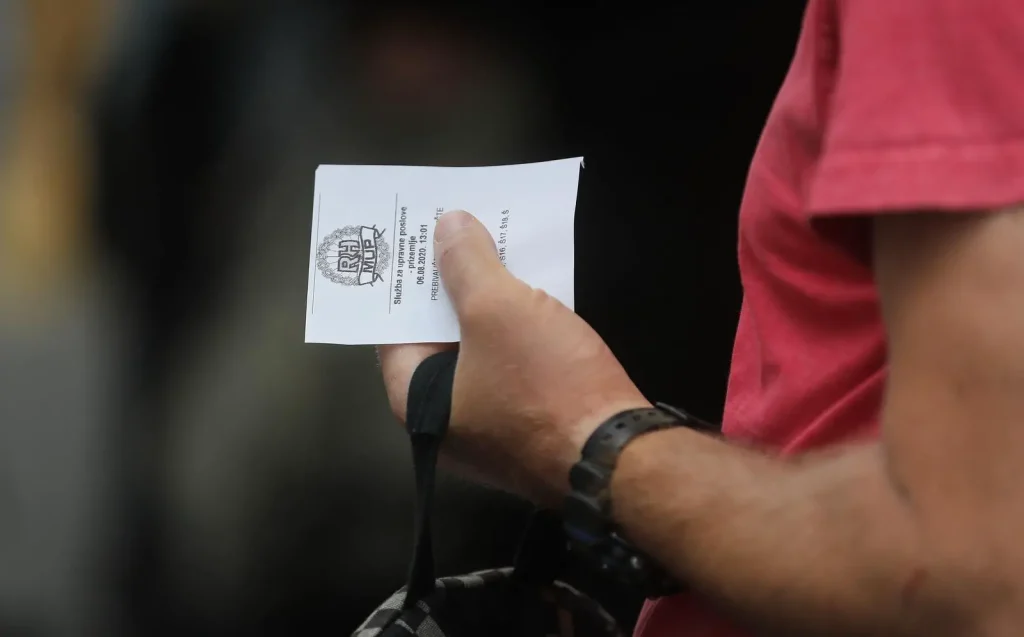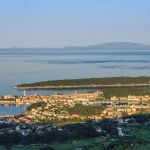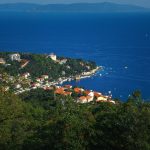Who are third country nationals?
Third country nationals are nationals who hold the citizenships of countries which do not belong to the European Economic Area (EEA) and British nationals who did not exercise their right to free movement when the UK was an EU member state. These people have three types of stay in Croatia available to them. If you’re serious about moving to Croatia permanently you must typically go through each, they are as follows: short-term stay, temporary residence, and permanent residence.
Short-term stay
Short-term stay is the right to remain in Croatia for up to 90 days in a 180 day period, regardless of whether you required a visa to enter or not. This can really only be shortened by the specifics of your visa, if you needed one, so make sure to read what it says, then read it again, and again. Typically, however, it is 90 days in any 180 days.
Temporary residence
A request for temporary residence for a third country national who does require a visa to enter Croatia should be submitted in a diplomatic mission, more specifically a Croatian consulate in their country of origin, and, I’ll repeat, not in the Republic of Croatia, as is the legal procedure for EEA citizens and third country nationals who do not require a visa.
In some circumstances, such as if you’re the life partner or the family member of a Croatian citizen, you might be permitted to submit your application for residency within Croatian territory, but do not risk it, if you’re a third country national who needs a visa, you run the risk of being refused and told to do so from your own country, before returning again. Save yourself some cash and don’t leave this up to fate, it isn’t worth it. Do it from home after being granted your visa to enter.
If, however, you manage to be given the green light to apply from within Croatia, make sure you do so at the soonest possible opportunity, and no later than eight days before the end of your permitted 90 days of stay. Failure to do so can result in a fine.
You can apply for your first residence permit within several circumstances. They are: family reunification, life partnership or marriage, work, education, for research purposes, humanitarian reasons, or other purposes.
If you apply under ”work”, your permit will be a stay and work permit.
Choose which one you choose to go for carefully as this will govern the reasons behind the Ministry of the Interior (MUP) granting you a permit. If you’re found to have strayed from the reason(s) provided, you might end up in some hot water or even risk having the permit terminated.
While permit termination is indeed a worst-case scenario and getting a fine is a more likely ”punishment”, my advice would be to apply for ”other purposes” to give you more freedom while living in Croatia.
When an application is successful, then it’s successful, and your worries are over for a year before renewing it, but upon being informed of your success, make sure to ask just what purposes it has been granted for, just to be sure.
Caveats
Please be aware that many third country nationals have been surprised to be told that they can only apply under ”other purposes” for their first year of residence in Croatia. After that, you should expect to be asked to provide a concrete reason, such as family reunification, life partnership or marriage, work, education, humanitarian reasons (and be able to prove that your reason is true), to be granted a second year. This is not always the case, but it does happen very often.
What do you need to provide to be approved as a third country national?
Your birth certificate
A copy of your birth certificate
A valid passport
A scanned copy (its wise to make several copies), of the photographic ID of the page with your details in your passport
A colour 35x45mm photograph (passport style, not passport size – MUP will either take your photo there and then or direct you to a nearby place to have it done to the correct measure)
Proof of health insurance (ask specifically as to how this can be showcased at the consulate if you apply from outside of Croatia)
Proof of funds to sustain yourself for the foreseen length of stay in Croatia (this can be proven with a printed statement from the bank showing and attesting to the amount in the account)
Proof of the justification of the reason behind your request for temporary residency
Proof of having housing (this can be proven in several ways, either with a notarised rental contract, proof of home ownership, or having your landlord or whoever you’re staying with come with you in person)
Proof of having paid consular tax if your application has been made in your country of origin, which, as stated several times, it should be
In some cases, a police clearance certificate from the applicant’s home country is required, however, this is not always asked for, so make sure to ask if you need this beforehand!
The documents submitted with the correct form you must fill in from MUP must be either originals, or certified copies. These foreign documents are usually required to be translated (with a certified translation) into the Croatian language. The documents must not be older than six months (aside from the obvious documents which will be older than six months, such as your original passport and original birth certificate).
The conditions for approval of your residence permit
As a third-country national moving to Croatia, you will be granted temporary residence if you can prove the purpose of your request for temporary residence, if you own a valid travel document/passport, the correct health insurance, and in the case that there are no restrictions on your entrance or stay in Croatia, and that you don’t pose a threat to public health or to national security.
In some cases, applicants are told that they do not need to prove that they have health insurance or the means to sustain themselves for the length of their stay if they are the family members of a Croatian national. Don’t rely on this, depending on who you speak to, this requirement alters. Make sure you have the means and are ready to prove you have both should you be asked to do so.
The first temporary residence permit for a third country national moving to Croatia is typically issued with a validity of up to one year, this isn’t always the case and in some situations it can be for longer, but usually it is one year and you should therefore expect it to be. The travel documents of third-country nationals requesting temporary residence must be valid for at least three months longer than the period covered by the temporary residence permit.
The permit is provided first in the form of a white sheet of paper (registration certificate) which acts as your temporary ID, and then, about three or four weeks later, in the form of a biometric residence card which also acts as photographic ID.
If you’re applying at a diplomatic mission/Croatian consulate abroad, make sure to ask how the following procedure works. If you have made your application as a third country national within the Republic of Croatia you will be given a slip of paper attesting to the fact that your request has been granted while the card is made. Do not lose this piece of paper!
As previously stated, MUP will either take your photo at the station or direct you to a place in which to have it taken.
If you have managed to apply from within the country, you will be required to come and pick up your biometric permit in person. This is likely the same when having applied at a consulate abroad. Again, ask about the consulate procedure where you are. If you have been allowed to apply from within the country, you will be allowed to stay in Croatia legally until a decision on approval is reached.
Caveats
Once you’re granted your residence permit, you must carry it on your person at all times when in Croatia, you can be stopped and asked to show it by the police, just as any national can. If you fail to produce it, you can be hit with a 100 kuna fine.
If you change your address, make sure to inform the police. If you move to a different city or jurisdiction, make sure to inform the police in your new city and be ready, if asked to do so, to provide proof of the move. Don’t be taken aback or surprised if the police decide to turn up at your door at random to ”make sure you really do live there”, this doesn’t happen to everyone, but it can and does occur.
If you do move to another area of the country, the rule is that you must inform the police in your new area as soon as possible (typically within 15 days). This rule is very loose. When you go to the police in your new area to register your change of address, you will need to have a new ID card made and pay the administration fee (79.50 kuna), and have a new photo taken. This is not a new application and is just a formality.
Third country nationals with temporary residence must not leave Croatia for periods longer than thirty days in continuation unless they have a good reason and are given permission by MUP to do so. This is something that should be discussed with MUP or at your consulate of initial application as you’re likely to not be told anything about this unless you ask yourself. If you can read Croatian, you can read more about that here.
Permanent residence for third-country nationals
You can renew your temporary residence permit year on year at the police station should you have been granted a one year permit. As is typical, you must do so several days before the expiry of your current permit, make sure to ask how many days before expiry you need to do so. This is typically 60 days before expiration of the current permit. Failure to adhere to this can result in a fine.
To repeat what I have already written a few paragraphs ago, third country nationals can expect to need to provide a concrete reason (and concrete proof of that reason) for a second year of residence and may find that ”other purposes” won’t be accepted again.
After five years of continuous, legal residence in the Republic of Croatia, you have the right to apply for permanent residence. Permanent residence comes in the form of a similar biometric permit but with a validity period of ten years, which is then simply renewed like a passport would be every decade, without any further questions or requirements from the authorities.
What will permanent residence mean?
Permanent residence provides almost all of the rights a Croatian citizen enjoys and when granted, you are no longer subject to any conditions as long as you do not leave Croatia for more than two consecutive years, or for more than five consecutive years if you’re a British national who held legal residence before Brexit (December the 31st, 2020).
You can access the state’s social security system, you can work and carry out services freely, in any manner citizens do without needing any type of special permit or permission for foreigners, and you can leave the country as often as you’d like to.
In some circumstances, you may be allowed to apply for permanent residence before completing five years of temporary residence, I’ll provide more detail about that a little later.
The application for a permanent residence permit should be filed with the police responsible for your place of residence as a third country national, and the application is decided upon by the Ministry of the Interior. As a third country national, you’re not bound by EU law and therefore your fundamental right to permanent residence is not the same as it is for a person from the EEA, and at the time of the decision on the application, the third-country national must have a valid temporary residence permit.
While not always the case, as Croatian law states that a foreigner can stay in Croatia while awaiting a residence decision from the authorities, it could mean that you’ll need to apply for another temporary residence permit while you await the outcome of your request for permanent residence.
Permanent residence will very likely be granted to third-country nationals who have been legally resident for a period of five years (holding temporary residence, asylum or subsidiary protection) up to the date of their application. Continued residence means that in these five years Croatia, the third country national has not been absent from the country for more than ten months over that five year period.
In addition to permanent residence after five years of continuous stay, permanent residence can be granted in four other special cases according to Sredisnji drzavni portal:
A third-country national who has been granted temporary residence for a period of three years and who has held refugee status for no less than ten years, as evidenced by a certificate issued by the competent state body for refugees.
A third-country national who resided in the Republic of Croatia on the 8th of October 1991 and who is a beneficiary of the programme of return, as evidenced by an appropriate certificate attesting to that fact.
A child living in the Republic of Croatia: whose parents held a permanent residence permit at the time of the child’s birth, or with one parent who, at the time of the child’s birth, was granted permanent residence (with the consent of the other parent).
A child with a parent who has been granted permanent residence in the Republic of Croatia at the time of childbirth, with the other parent having been unknown, who died, or has been declared deceased.
A third country national who was born and has, since birth, been living on the territory of the Republic of Croatia, but for justifiable reasons over which they had no influence, they had no type of regulated stay (as evidenced by a birth certificate, proof of attendance of preschool or an educational institution, proof of employment, evidence of the use of healthcare services, evidence of the use of social care).
Conditions for the approval of permanent residence for third country nationals
The conditions for the approval of permanent residence are the possession of a valid passport, means of subsistence and health insurance, knowledge of the Croatian language and the Latin script (proven via an exam taken in an educational facility which MUP accepts, ask for further information), and that the third-country national is not a threat to public order, national security, or to public health.
The Croatian language and Latin script language exam can be conducted by higher education institutions, secondary schools and adult education institutions that run Croatian language programs approved by the competent ministry. The cost of the exam is borne by you as the third country national yourself.
The Croatian language and Latin script exam doesn’t have to be taken by children of preschool age, persons older than 65 if they’re not employed, and persons who have completed their elementary, secondary or higher education in Croatia.
Permanent residence will not be granted to anyone who has been denied asylum or subsidiary protection.
The situation is slightly different if you’re a third country national who already holds permanent residence in another EEA member state, and I’ll delve into that in another article.
For more of our How to Croatia content exploring moving to Croatia, living in Croatia and administrative formalities, make sure to keep up with our dedicated lifestyle section.











